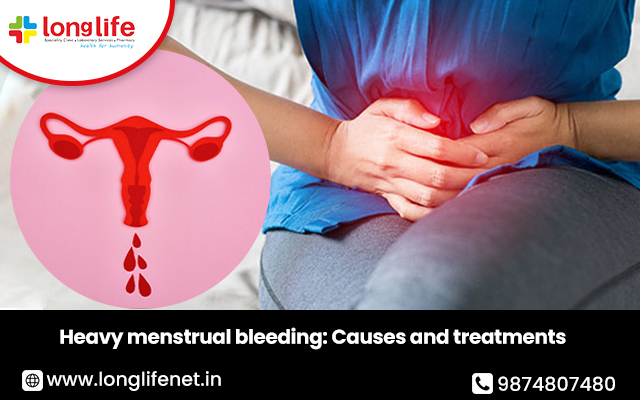Heavy menstrual bleeding, also called menorrhagia, refers to a menstrual cycle that extends beyond seven days. Prolonged heavy bleeding can significantly impact one’s quality of life. Moreover, it may result in anemia, leaving you weak and exhausted. Below, the best gynecologist doctors in Mukundapur have explained the possible causes and treatments of heavy menstrual bleeding in women.
Causes
Below, we have discussed some causes that contribute to the heavy flow of menstrual blood:
- Hormones being out of balance: In a normal menstrual cycle, estrogen and progesterone maintain a balance, regulating the buildup and shedding of the uterine lining. When hormones are imbalanced, the endometrium becomes excessively thick, leading to heavy menstrual bleeding or unexpected bleeding between periods. Conditions like obesity, insulin resistance, thyroid issues, and Polycystic Ovary Syndrome (PCOS) can contribute to hormone imbalances.
- Problems with the ovaries: Ovarian issues can occasionally lead to the failure of egg release, a condition known as anovulation. In such cases, the body deviates from its typical production of the hormone progesterone during the menstrual cycle. This imbalance in hormones can result in excessive menstrual bleeding or unexpected bleeding episodes between periods.
- Uterine fibroids: These are non-cancerous tumors that may result in prolonged or heavier-than-usual menstrual bleeding.
- Adenomyosis: This refers to a condition where tissue from the uterine lining extends into the uterine wall, leading to painful periods.
- Cancer: Uterine or cervical cancer can lead to irregular uterine bleeding, characterized by heavy menstrual flow.
Diagnosis
Doctors usually conduct the following non-invasive procedures to diagnose this condition:
- During saline-infusion sonography, also known as a sonohysterogram, saline is infused into the uterus to examine the condition of the uterine lining.
- A hysteroscopy enables a gynecologist to visually assess your vagina, cervix, and uterus. It is conducted to examine the uterus for polyps, fibroids, and adhesions. If these are identified, the doctor can use the hysteroscope to eliminate them, which might be contributing to abnormal bleeding.
Treatments
Gynecologists in Mukundapur recommend the following medicines to treat and manage heavy menstrual bleeding:
- Nonsteroidal anti-inflammatory drugs: Commonly known as NSAIDs, these are effective in regulating menstrual blood loss. Additionally, they can alleviate the intensity of menstrual cramps, making them less painful.
- Oral contraceptives: In addition to serving as a contraceptive method, these can assist in regulating menstrual cycles and reducing heavy or prolonged vaginal bleeding.
- Oral progesterone: It is effective in addressing hormonal imbalances and minimizing heavy menstruation.
The best gynecologist doctors advise women to seek medical attention if they experience heavy menstrual bleeding for a prolonged period, as it can be an indication of underlying health issues.

